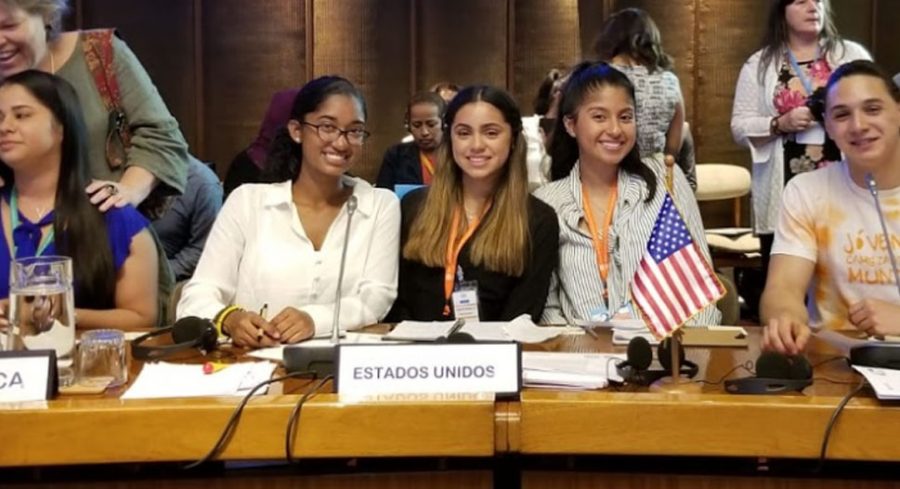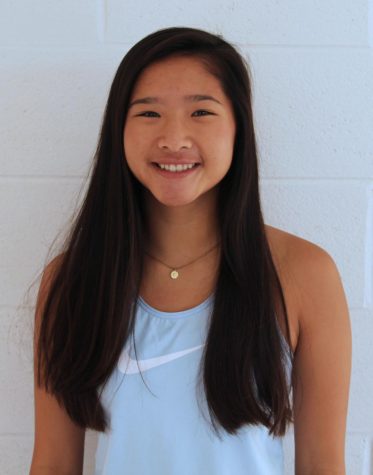Students Represent America, Present Project at International Conference in Chile
Suarez, Moreno-Canales and Estrada (left to right) presenting their project at the CEPAL headquarters in front of ambassadors.
December 18, 2018
Teens strive to assert their voice on prevalent issues in today’s changing world. Juniors Carmela Suarez, Ashley Moreno-Canales and Scarlet Estrada showed that despite their age, they can make a difference in the world as they seized the opportunity to represent the U.S. in an international youth conference in Santiago, Chile.
Suarez, Moreno-Canales and Estrada were the first high schoolers in the history of the Concausa program to represent the U.S. in the Nov. 21-Nov. 30, 2018 conference. Spanish teacher Maritza Vakas traveled with the girls as their mentor. Concausa is a youth initiative created two years ago by America Solidaria, the Economic Council of Latin America and the Caribbean (ECLAC) and UNICEF in collaboration with Fundación Caserta, which aims to break the cycle of poverty in the Americas by 2030. They seek out youth groups all over the Americas that will create change through their new ideas and projects.
“Until we got there, I was like ‘this is the best experience of my whole entire life,” Suarez said. “I am so grateful that I was able to be given this opportunity.’”
Suarez, Moreno-Canales and Estrada’s project, “Bridges of Integration in the 21st Century” aims to break down the obstacles of language barriers, difficulty transitioning to a new education system and the culture shock for Hispanic students and families at RHS.
They plan to integrate these “bridges of integration” through diverse clubs and workshops for English as a Second Language (ESOL) families to learn about the education system at RHS.
In order for us to help, we have to come together. -senior Scarlet Estrada
Their group was one of the 17 teams of Central, South and North America to be selected out of 706 submitted proposals.
The trip included a series of training activities at the Chilean Capital in which the students and mentors overcame obstacles whether they were physical or psychological. One activity included a ropes course in the trees, followed by a tree planting ceremony in the mountains. The seeds that they planted symbolize growth that the youth will experience in their futures.
At the end of the conference, a seminar was held with all 17 groups and mentors to present the proposals that they worked on to reveal their community’s issues and solutions that will contribute to the the United Nation’s (UN) 2030 Agenda for Sustainable Development that promotes peace and prosperity around the world. Some of its 17 Sustainable Development Goals include an end to poverty, tackling climate change and a quality education for all students. It was presented before a panel of representatives from America Solidaria, the United Nations, ECLAC and UNICEF.
“I gained the knowledge of knowing of what’s actually going on, not just in the United States but in different countries,” Estrada said. “Even the people that were doing these projects, they were all suffering from these things. In order for us to help, we have to come together and actually try to eliminate all these problems.”
Suarez, Moreno-Canales and Estrada’s project aims to promote equality in the education systems in the world, starting with RHS. As the achievement gap continues to widen between Latinos and other groups im MCPS, these girls strive to help students and families struggling with the new life and educational system in the U.S.
The girls also help in the monthly workshops for Latino families, run by assistant principal Monica Abuliak. In these workshops, parents are taught how to be more involved in their child’s school life such as how to check their grades and how to navigate online resources.
After their presentation in Chile, Suarez, Moreno-Canales and Estrada were approached by ambassadors from other countries and organizations who were interested in their project.
One of the most impactful parts about the trip for the girls was the Declaration of Children’s Rights that they created in collaboration with the rest of the people in the program, they said. This document that was signed by 25 out of 26 country representatives, informed UNICEF on what needs to be improved in different parts of children’s lives such as education, home life and gender equality, Estrada said. By viewing all of the different presentations, they said they also learned more about the struggles that people go through on a daily basis around the world.
Many of the projects presented by other groups at the conference relate to the Spanish curriculum. Vakas was touched by some project ideas and shocked by the living-situations that adolescents struggle with such as parents preferring their child to help at home rather than going to school in some parts of Mexico, she said.
“I felt like ‘wow, we live in our little box’ and we have everything, and we just look at Youtube and we hear it from the news, but it’s not the same from someone who actually experienced it,” Vakas said.
Rather than students only learning about these kinds of things from a textbook, Vakas plans to apply lessons learned from this conference into her classes. She said this trip inspired her to organize more field trips to help others in the community and to expose students to the realities of the harsh living conditions of people’s lives.
Suarez, Canales and Estrada’s current focus within their project is Noche Latina in which their Latin Dance group will be performing dances from their cultures Dec. 19 in order to share elements of Hispanic culture through dance.





